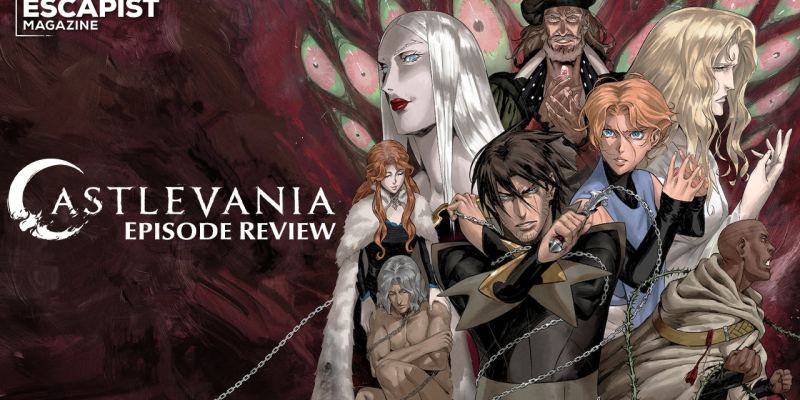The following review contains spoilers for Castlevania season 3, episode 3, “Investigators.”
After an episode stuffed to the gills with setting up several different status quos, “Investigators” takes time for us to stop and breathe alongside the characters. The episode opens up with a peaceful scene between Sypha (Alejandra Reynosa) and Trevor (Richard Armitage) just simply having time to sit and talk. Yes, their conversation eventually focuses on flaming goat turds falling from the sky, but it offers a brief moment of respite that we’re simply not used to in the series.
“Investigators” is the first time this season where it truly feels like Castlevania is taking time to explore its themes and allow its characters time to just exist as characters without being thrust into a grand, all encompassing epic. Sypha and Trevor are nonetheless hired by the town’s leader, known as the Judge (Jason Isaacs from Harry Potter), to investigate the suspicious activity in Sala’s priory after a night creature invaded it but never came out. In a lesser show, Sypha and Trevor would have received their task without any finesse, but this scene is almost adorable with how excited Sypha is to be a hero while Trevor clearly shares her enthusiasm but doesn’t want to admit it.
It only just hit me now that for all of the time spent with our heroes during the first two seasons, I can’t say I really know Sypha or Trevor all too well. They have their histories with their respective tribes, but they were their roles within the party first and characters second. Trevor was the hunter, Sypha was the sorceress, and that was where their characterization began and ended. Even spending just a few minutes at the beginning of the episode to reflect on their past adventures was enough to really establish that these two lovebirds do share genuine chemistry.

While I can praise the writing for keeping things fresh, subplots are proceeding down predictable paths. We catch up with Lenore (Jessica Brown Findlay) and Hector (Theo James) as Lenore attempts to woo Hector onto Carmilla’s side. Lenore tries to slowly earn Hector’s trust with food and sympathy, but it’s clear that Lenore is going to eventually try and seduce Hector and make him willingly fall for her, thereby allowing Lenore and her sisters access to Hector’s power. However, Hector recognizes this and attacks Lenore — only to be severely beaten by her. She’s still a powerful vampire at the end of the day, but seeing her refer to herself as the diplomat of the group even after beating Hector senseless positions her as the least of four evils and his best shot at survival.
While all of this is going on, I have to say it is a bit jarring that not only has Castlevania’s staple violence subsided (which isn’t in itself a bad thing), but the scenes that are here are framed dully, just a back-and-forth of people speaking. It isn’t interesting to watch, especially combined with Castlevania’s inconsistent animation quality.
While we don’t cut to Alucard and his pupils this episode, we do get a discussion between Isaac (Adetokumboh M’Cormack) and the Captain (Lance Reddick). Like the other scenes, it’s the two of them just sitting across from each other and talking with barely any movement, but the examination into Isaac’s character was still too rich to not enjoy.
Isaac views his cause as religious. He firmly believes that humans deserve to die and that he’s an instrument of God, creating demons to purge the world of all evil and selfishness, with his first targets being Hector and Carmilla. If Issac is so loyal to Dracula and his cause, then it’s not a stretch to make the connection that Dracula is a God to Isaac and Hector and Carmilla’s betrayal is akin to heresy. The Captain is fine with this, but then he asks the obvious question: What happens after that? Once he fulfills his goal of killing Hector for his crimes against their former master, what will Isaac do? If he plans on committing genocide on the human race, will he eventually kill himself?
Regardless of Isaac’s plans, the Captain doesn’t believe that Isaac truly means what he’s saying, and it’s hard not to find his argument engaging. Isaac only looks at the negativity that humans are capable of. The Captain acknowledges that humans are cruel and that humans probably deserve to die, but the end of human cruelty would mean the end of human kindness too. The generosity of the merchant and the hospitality of the Captain would not exist, which is a concept Isaac has never dealt with before. In the Captain’s eyes, Isaac can either use his powers to selfishly kill everyone and erase all potential for humans to be better or use his incredible powers to teach people to be better.
It’s moments like these that make “Investigators” work as an episode. If Castlevania continues to mine the depths of its characters in the same way that Dracula was fleshed out, season 3 could turn into a riveting drama about the nature and morality of humanity. It just feels like “Investigators” works in spite of itself, framing these intriguing ideas with such lackluster presentation. Only half the episode is really strong, as some of Trevor and Sypha’s discussion with the Judge was underwhelming, and nearly all of Hector’s scenes were predictable. Still, what does work works wonderfully, so hopefully now we can feature some strong character work and really start picking our heroes apart and testing them in new and exciting ways that don’t feature giant monsters.
